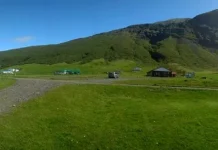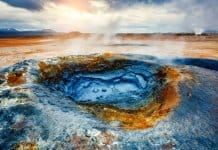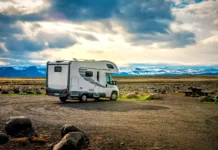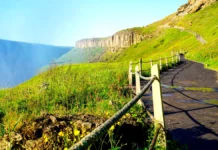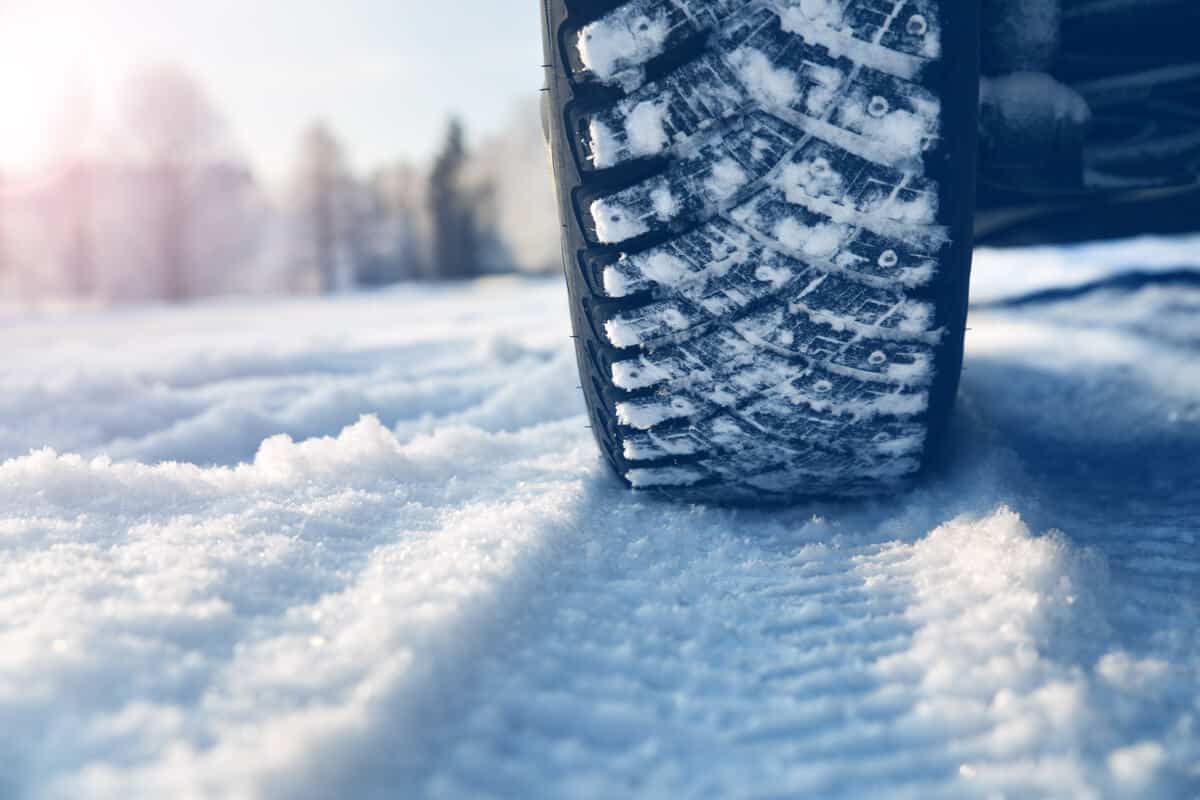Iceland is a magical place that turns into a winter wonderland from November to late March. It’s becoming a popular time for tourists to come due to lower prices and breathtaking landscapes. But if you plan on camping in Iceland during the winter, there are some things related to driving safely that you’ll want to know about. Snow tires in Iceland are important when you have ice on the road, strong winds, and snowy conditions. Make sure you know the difference and get the right ones for your trip.
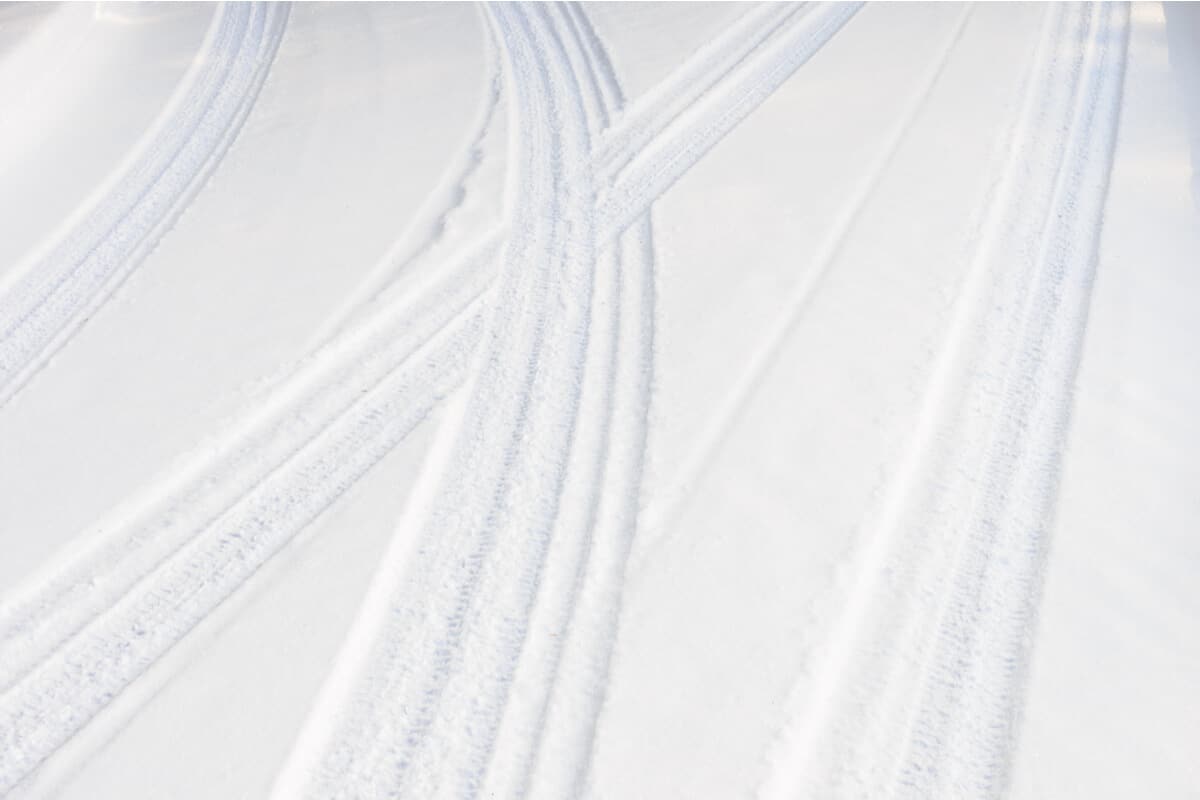
Why You Need Snow Tires in Iceland
Driving in iceland can be brutal, especially in the wintertime. From snow on the road to black ice, you have to practice a lot of caution when dealing with the road conditions here. I know that once you pick up your rental car or camper at Keflavik Airport, you’ll be anxious to start your journey. Amazing adventures such as glacier caverns, geothermally heated hot springs and the dazzling Northern Lights await you on your road trip.
But part of driving here means that you’ll have to face the snow and ice that you’ll no doubt encounter. Winter tires, snow tires, and studded tires are all designed to help you to safely navigate the icy roads and snow crunching beneath your vehicle. You’ll want the extra grip and traction that they provide as you make your way around Iceland’s gorgeous Ring Road.
Winter Tires vs All-Season
So what makes winter and snow tires different from the types of tires that you use during the rest of the year? There are a few factors. To start with, all-season tires have fewer cuts in the tread (called sipes). Winter tires have more so that they can pull water from the road’s surface more effectively. This means they can face all types of weather and road conditions like slush, snow, ice, mud, as well as pavement that is cold and dry. This is a must for winter in Iceland.
There are also special snow tires that you can get which are better suited to icy conditions. Studded winter tires have grown in popularity in many countries the various reasons. These special tires have studs or small pieces of metal on the exterior part of the wheel. This helps the tire better grip the ice on the highway as you’re driving. These are preferable when it comes to driving on rough roads and in difficult conditions.
Of course, you can’t use these types of tires outside of the winter season as they will severely damage the asphalt on paved roads. Scraping from the metal of the tires will tear up everything in its path. There are fines for using studded tires after April 14th, so rental companies are vigilant about making sure you have the right kind on your car.
Non-studded winter tires in Iceland can be used year-round. But if you are driving from November 1st to April 14th, they must have a sickness of at least 3mm (1/11th of an inch). All season tires only need to have a minimum depth of 1.6mm.
The differences may be subtle, but they make all the difference when it comes to driving safety and enjoying your Icelandic winter adventure.
Iceland Winter Road Conditions
Tourists who come to Iceland for the first time are often taken by surprise by several things. These elements all affect driving and road conditions, especially in the Iceland winter.

The first is just how windy it is. Iceland has been known to have hurricane-force winds during really strong winter storms. Hopefully, you’ll be lucky enough to avoid coming in the middle of a snowstorm. But you will still encounter quite a bit of wind, even in cities like Reykjavik where buildings offer a bit of protection.
Out on the open highway, you will deal with strong gusts that can blow you off the road or at least make steering quite difficult. Renting a vehicle with a four-wheel drive will help you have better control as you face the elements had on.
Another thing that catches visitors off-guard is just how quickly the weather can change. You can go from driving with clear skies to being surrounded by white snow blanketing the ground in a matter of hours. You don’t want to get caught unprepared or worse, be driving in the middle of all of this. Check the Icelandic Meteorological Office’s weather report on a daily or even hourly basis. This is especially true for the times when you are driving between cities or towns.
Of course, you know that there’s going to be lots of ice and snow on the road. Drive slowly and cautiously when conditions are bad. And be wary of hitting patches of black ice. This slippery, invisible danger lurks on roads during the colder months and is best avoided in general.
Icelandic Law and Rental Companies’ Policies
By law, Icelandic rental companies have to furnish their vehicles with regular winter tires that are non-studded. But many companies in Iceland automatically already have studded winter tires on your rental car or campervan during winter driving season. When you rent a car or camper for your Iceland camping trip, your company will already have provided the right type of tires. As you are planning your trip, talk to your rental provider about the different options available for your particular vehicle. They will be able to answer any questions and resolve any doubts that you have.
Iceland Car and Camper Rental Winter Tires
While there are a few different options available, the most important thing is that you feel comfortable when you’re behind the wheel. If having a specific type of tire gives you more confidence as a driver, all the better. The rental company knows best and they have experience helping drivers pick the right vehicle. They’ll be happy to answer all of your questions about Iceland snow tires in depth. If you are traveling between November and April, they are the experts to turn to for advice and insight.

When picking up your rental in the winter, always check the quality of the tires when they show you to the vehicle. Don’t accept the car or camper van rental if your winter tires or studded tires look worn down. You should request newer ones if the ones on your rental look to be old. It’s not safe to drive on worn down tires if you’re navigating icy roads as you will end up slipping due to lack of traction.
You should be perfectly fine, however. The rental companies care about their customers’ safety and want you to have an amazing time during your epic Iceland road trip.

